#screenwriting for beginners
Explore tagged Tumblr posts
Text
#filmmaking#actress#screenplay#film#screenwriting tips#writer#filmmaker#actor#bupphaofficial#acting#writing taster workshop#screenwriting online course#writing class near me#screenplays#writing movies#writer community#screenwriting for beginners
2 notes
·
View notes
Text
Yuri Manga for New (AND Not-So-New) Readers
I was talking on discord about some good yuri for beginners, and figured I'd repost here.
I get way more detailed some of these recommendations in this post, and there's great recs from another person too! Check it out!
I'm doing this accounting to various tones and tastes, so what works as a beginner yuri for one person might not for another, just read the info to figure out what your jam is.
I'll put a star by the ones about adults (which is the majority of them) since I've found that's always something people want.
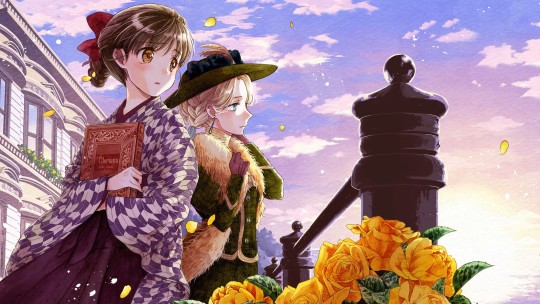
Goodbye my Rose Garden (Victorian yuri w/ beautiful art, just beautiful all around)*
How Do We Relationship? (messy adult relationships and lots of actually realistic intimacy)*
She Loves to Cook and She Loves to Eat- (A woman loves to cook but doesn’t have a huge appetite, only to find the woman next door to her does! She cooks for her and they really start to bond over food and the trials of being working adults. Yes, this is the one where the woman googles lesbian. It's really good)*
Bloom into You- a common go-to yuri for beginners for a reason, about a girl who believes she can't fall in love meeting a girl who wants to date her specifically BECAUSE she can't fall in love. Find out more about it and hear my thoughts here. It has a gorgeous anime that doesn't cover the complete story.
Doughnuts Under the Crescent Moon (sweet office lady romance, ace rep) *
Catch These Hands! (These two women were delinquents and rivals in high school, they meet up again, one reveals she was always into the other, she challenges her to a fight on the condition that if the other woman loses she'll date her. Lots of slapsticky fun and great for any lover of girl delinquents)*
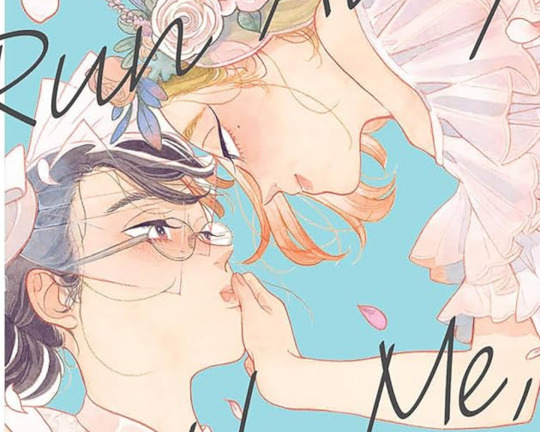
Run away with me, Girl (there's some abuse shown in this one, but it's a story about healing, the premise is these girls dated in high school, but one of the pressured herself "normal" and marry a man, that man turns out to be abusive, so when the former lovers reunite, they decide to run away together. It's got beautiful art and a well done story)*
The Moon on a Rainy Night (absolutely spectacular, explores the relationship between a hard of hearing girl and her closeted classmate, the characters are complex and the writing is so good!)
Kase-san And...- Starting with Kase-san and the Morning Glories, this is a very fluffy and sweet high school romance. It also has a short movie. (as the manga goes on they become college students, too)
The Two of Them Are Pretty Much Like This (slice of life about a voice actress and anime screenwriter who live together as a couple. Unfortunately the ending is a bit abrupt (and likely premature) but I love their relationship)*
My fave Otherside Picnic is great for scifi and (mild) horror lovers. It's Scifi creepypasta adventure yuri. It's a slow burn but does truly spectacularly deliver on the gay. Has an anime, it's not great, you should start with the novels. Wrote an article here. https://www.animefeminist.com/how-otherside-picnic-masterfully-uses-horror-to-explore-abuse-and-show-healing-queer-love/ *(v young adults, college students)
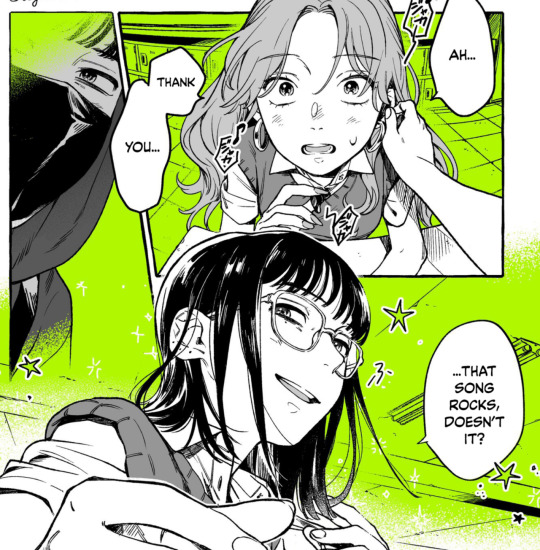
The Guy She was Interested in Wasn't a Guy at All: (A web manga about a girl who works at a record shop. Her classmate , Aya, wanders in but doesn't recognize her because she has her hair hidden with a hat and is wearing a face mask, and Aya assumes she's a guy. They bond over music and slowly start to get closer...and Aya's finds her heart is fluttering not only over this mysterious boy, but her female classmate that seems a lot like him...) It's got a physical release too!
This Monster Wants to Eat Me: (A depressed girl who's been searching for death gets approached by a mermaid who wants to eat her...but the thing is, our monster mermaid is a gourmet who wants her to be as delicious as possible, which means she's going to make her happy first (as apparently that enhances her flavor), and fight off all the other monsters who want to kill her. This is TOP TIER yuri horror and a must read for any lover of monster girls, especially monster girls drenched in the blood of their enemies, it's so good)
I Married my Best Friend to Shut My Parents Up (girl and her friend get married simply so her parents will stop bugging her about being single. You can probably guess where it goes from there) *
I Married my Female Friend (similar premise, except no parents involved, it's a platonic marriage they both agreed to with the promise they'll divorce if one of them falls in love. But one woman has decidedly not platonic feeling for the other that she's hiding from her, so things start turning a bit romantic...the ending is a little rushed but good)*
Whisper Me a Love Song: (A girl named Himari sees her upperclassman, Yori, perform with her band and falls in love with her music. She confesses her love of Yori's music, and Yori mistakes it as Himari confessing to being in love with her. Yori falls head over heels at first sight. (if you don't like miscommunication, dw this is cleared up fairly quickly and new drama ensues) Has an anime covering early material)
Monthly in the Garden with my Landlord* (it didn't really hit with me but I might give it a shot again, it's solid despite the terrible title, a woman moves into a house and finds she'll be cohabitating with an idol) (Some more titles I haven't fully read that could appeal: Still Sick*, Cheerful Amnesia*)
Hana and Hina After School: (a cute three volume about a gyaru and shy girl working together at a shop after school and catching feelings)
After Hours: (A cool punk girl meets a girl who's been abandoned by her friend at the club, and she introduces her to the world of DJ'ing...and romance!)*
My Cute Little Kitten (two roommates adopt a cat...and maybe fall in love?)*
I think all of those work as solid intro- though it does depend on what flavor you're looking for!
This article also covers some of these recs and some manga I didn't mention due to not having completely read it. so check it out: The Beginners Guide to Yuri Manga.
Here's some titles to try when you're a little more familiar with yuri (or you can try them now! I'm not your boss!)
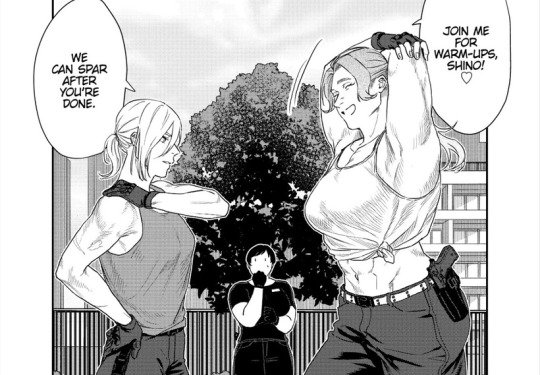
SHWD (action yuri that's taking forever to come out over here physically, featuring extremely muscular women fighting monsters. I think it was forced to end prematurely too)*
Kiss and White Lily for my Dearest Girl: (The main storyline is about two academic rivals, where one is determined to rank first in class, and the other is an effortless genius who becomes intrigued at the possibility of someone beating her. Honestly they have the kind of messy combative sexual tension I wish we'd see more often in yuri because it's so good. The story follows other couples too. However, big warning for some nonconsensual kisses in early volumes, and a storyline in volume 7 that has implied incest and an age gap, though the older sister doesn't go through with it onscreen).
Sweet Blue Flowers/Aoi Hana- (This one is a little bit dated, and boy is the ending weirdly paced, but a lot still holds up imo. A painful and sweet coming of age tale, it also has an anime that's good but ends too soon.
One teenage characters backstory involves some very heartbreaking statutory rape/csa that's also incestuous (older cousin). The perpetrator is extremely manipulative and she even pulls the "oh no did I turn you gay? thing" but it's definitely framed as a bad thing.)
The Summer You Were There: (For tragic and doomed yuri lovers. A deeply depressed girl starts her journey to healing thanks to a girl who courts her and enjoys her writing. Unfortunately, said girl is terminally ill. The manga is a heart wrenching meditation on grief, redemption, and how being sick doesn't mean you can't still be loved).
Yuri is My Job- a story about messy lesbians in a yuri-themed cafe, and how their real relationships differ from the personas they put on. Read more about it here. Big warning for sexual assault of a minor (by an adult villain) in volume 12. Has an anime covering early material.
#yuri#yuri recs#pride month#pride 2024#pride#manga#bloom into you#goodbye my rose garden#doughnuts under a crescent moon#yuri is my job#shwd#how do we relationship#run away with me girl#the guy she was interested in wasn't a guy at all#kiss and white lily for my dearest girl#aoi hana#kase san#the two of them are pretty much like this#I married my female friend#she loves to cook and she loves to eat#my recs#the moon on a rainy night#this monster wants to eat me#after hours#hana and hina after school#the summer you were there#whisper me a love song
892 notes
·
View notes
Text
✷ Tonk's Art Resources ✷
Hi! No one asked but I wanted to make a big list of art resources I use because I like to try and help people be creative! Not everything I list is free (mostly the books & some PDFs), but I’ll try my best to keep a big portion of it unpaid.
I've also made a carrd with the same links and a set of software links + prices but I'll be updating this with more things I find that I think would be helpful. :)
Drawing
GES DRAW PARTY - Timed model videos
Drawing Tutorials Online - Figure drawing tutorials (& fun SVA student sketchbook videos)
Line of Action - Timed model Photos
3 tips to improve your PEOPLE SKETCHING (fast urban sketching techniques), Sketching Scottie
Creating Backgrounds, Tim Mcburnie
Drawabox
Reference Angle
Kaycem
Colour Theory
Why Color Studies Are So Powerful, Light Ponderings
Marco Bucci
Colour Tips and Tricks, Iniro (PDF)
This post
Animation
The Animator’s Survival Kit, Richard E. Williams (book) - I think this one is a pretty obvious must-have
How to Animate Night In The Woods [Scribble Kibble #103], Crowne Prince - Helped me get a grip on After Effects
Little Miss Hellraiser Toon Boom Harmony Rig, Edu Bruks - Free Toon Boom Harmony rig
Alex Grigg // Animation for Anyone
BaM Animation
Storyboarding
Exploring Storyboarding, Wendy Tumminello (book)
Storyboarding Essentials: SCAD Creative Essentials, David Harland Rousseau & Benjamin Reid Phillips (book)
Storyboard Pro Crash Course/Tips for beginners, OhJeeToriG
A Guide To Storyboards, MagicBunnyArt (PDF)
Character Design
Character Design Crash Course - A huge free course document with assignments you can work through
Delicious in Dungeon - Fundamentals of Character Design, lines in motion
Writing
Writing for Animation, Comics, and Games, Christy Marx (book)
Screenplay: The Foundations of Screenwriting, Syd Field (book) - I have the 1987 edition
Reedsy
How to Plot a Comic From Start to Finish!, McKay & Gray
Portfolio Tips
How to make a Character Design Portfolio, Jackie Droujko
Top Tips on How to Kickstart Your Storyboard Portfolio, Brown Bag Films
25 Tips to Create an Animation Demo Reel, Sir Wade Neistadt
Extras
PuccaNoodles’ Animation/Art Resource Sheet
My Study References Pinterest board
Motivation Station - Playlist of sketchbook videos and some speedpaints that I use to motivate & inspire me
The Illustrated Freelancer’s Guide, Heather Parry & Maria Stoian (PDF) - Really useful for freelancers in the UK
Software substitution chart
Adobe Suite substitute chart
Remember to check out the carrd, it might have a more updated list!
613 notes
·
View notes
Text
Outlining Plot for Film School Application
Anonymous asked: I love stories and am applying to film school in a few months, but I struggle with understanding how stories work, as well as with outlining a plot, which is required for the application. I need to learn how to do it quickly and effectively, especially since I don't have a portfolio to strengthen my chances of getting accepted. Is there a workshop or network that focuses on story comprehension and development, rather than actual writing, that is beginner friendly?
[Ask edited for length]
A couple of recommendations:
-- Save the Cat! The Last Book on Screenwriting You'll Ever Need by Blake Snyder is a screen writing book that comes highly recommended. And, as a big fan of the the novel-writing version by Jessica Brody (Save the Cat! Writes a Novel), I can tell you it's about as comprehensive and is usually considered to be great for beginners.
-- The Helping Writers Become Authors web site, by author K.M. Weiland, has a huge story structure database that analyzes the structure of popular books, but also movies. Each story is broken down into its critical plot points: inciting incident, first plot point, first pinch point, midpoint, second pinch point, third plot point, climax, climactic moment, and resolution. The summaries are brief, to the point, and very helpful.
-- YouTube is an incredible resource for when you need to learn a lot in a short amount of time. While I don't have any particular videos to point you toward, I promise if you search "how to plot a movie" or "how to outline a movie plot" you will find a ton of videos, and you should be able to find some that resonate with you.
That's all I've got, but keep an eye on the comments in case others have suggestions!
•••••••••••••••••••••••••••••••••
I’ve been writing seriously for over 30 years and love to share what I’ve learned. Have a writing question? My inbox is always open!
♦ Questions that violate my ask policies will be deleted! ♦ Please see my master list of top posts before asking ♦ Learn more about WQA here
89 notes
·
View notes
Text
How To Write Good Dialogue (Part 1)

I'm gonna start this by saying I'm not trying to sound like a know-it-all. I am just tired of posts like these being absolutely fucking useless. I am aware this is basically me screaming into a void and I’m more than okay with that.
This guide is meant for intermediate screenwriters, but beginners are also absolutely welcome. :)
(about me)
-♠︎-♠︎-♠︎-♠︎-
I've noticed a rise in film students who want to make films that have no dialogue. Probably after your professor showed you Doodlebug, right? Fuck that.
I'll make another post about writing a short film, but all you need to know is: Don't waste the audience’s time. Most of these no-dialogue shorts have very little substance and take way too long to tell the shortest possible story. Not a good idea.
Useless Dialogue
Plain and simple, don't write useless dialogue. Useless dialogue is dialogue that just doesn't fucking matter. Dialogue matters by having ✨subtext.✨
What is subtext? Subtext is the meaning behind the action. That's it.
If I tell you that I love you and I got big doe eyes while I say it, it means I love you. If I tell you I love you through a clenched jaw without looking at you, I don't necessarily love you right now.
Simple, right? Great.
Now think about the subtext behind every line. Does your character mean what they're saying? Are they doing it to get what they want? What is going through their mind as they say it? As long as you know your character, you’ll have these answers ready to go. If you don’t, you’ll figure it out eventually. Just keep writing.
When you write your character walking into a Starbucks and saying, "One venti iced coffee," does that do something? Why do I need to see someone's boring Starbucks order? Do I need to know that your character's boring? Why are you writing a boring character? [Of course, in the rare situation where this is some revealing clue to the massive crime investigation, then it makes sense.]
Useless dialogue is any dialogue that has no meaning or purpose in your script. Delete and move on. You don't need to write entire conversations or scenes that bore us, just write what we care about.
I took a class once where my professor called a version of this "trimming the fat." Get us into your scene and out of your scene in as little time as it takes to have it achieve its full purpose in the script.
[P.S. You don’t “inject” subtext into your lines. Idk who started that vernacular in subtext teachings but I hate it.]
Show vs. Tell
I remember a glorious fight I got into with a Redditor last year about show vs. tell… TL;DR: Dialogue is “show” if you write it with intention and subtext. If someone says that dialogue is inherently “tell,” they’re wrong and can go fuck themselves.
Dialogue that is “tell” is expositional dialogue. But, hot take: Exposition isn't just in dialogue. It’s also those annoying clichés that make you roll your eyes in the theater (which we just call clichés and not exposition). I’m sure every professor I’ve had will disagree with this and then get me into a long conversation about it, but let’s ignore that for right now.
Have you ever seen a movie where a character rubs an old, worn-out photo of a young girl while looking depressed? That's exposition. That character has a dead daughter. No shit.
Clichés are incredibly annoying. We all know that. Assume that any cliché you see - in this context - is exposition and try your best not to write it. (Tropes are different and sometimes necessary, so I’m not talking about that.)
Point blank: When you have subtext in your lines, they are "show,” not “tell.”
Before moving on, I'll bring up that while technically the dead daughter photo is subtextual, it is as close to the character saying “My daughter is dead,” as you can get. Don't treat the audience like we're fucking stupid.
The First 15
If you don’t know what the Inciting Incident is, please look up “3 Act Structure” before reading this.
The first 15 pages of your script is the part that comes before the Inciting Incident. This is the part you want to get right because, although people probably won’t leave the theater, they will absolutely find something else on the streaming service they’re using. The people making said movie will also just toss your script in the trash before it’s even produced, so it's best to get it right.
Dialogue in the first 15 generally follows the same rules, but carries a heftier additional rule. All dialogue in the first 15 minutes must, must, must tell us something about your character.
Remember when I talked about that boring Starbucks order? Why is your character boring? Don’t write that. Don’t write nice characters. Or pleasant characters. Or friendly characters. No one cares.
You want empathy. This does not mean “relatable.” It means “empathetic.” There is a difference.
I personally relate to Vi in Arcane, but I empathize with Theo in Children of Men. Both are excellent, but one personally resonates a bit more with me. You cannot write a character that deeply resonates with every single person, it is impossible.
With each line of dialogue, you must be saying something about your character that generates the empathy. Instead of telling you how to do this, I’ll direct you to a movie that will do better than an explanation: Casablanca.
Watch how Rick interacts with the world. What kind of man is Rick? Watch what he does, what he says, and how he treats people and himself. Watch that empty glass on the table. Watch his contradictions. Everything. Those things matter and it’s what makes you want to watch Rick for the entire duration of Casablanca.
“Realism”
This is maybe more directorial, but make your characters human enough, not too human.
Too human is when you’ve tried your best to capture all those little life-like speech patterns. You know, the ones that no one fucking cares about.
If your character coughs, they’re sick. If they clear they’re throat, they’re uncomfortable. If a bruise isn’t going away, they’re going to die. Simple.
Every moment on screen matters. Everything the audience sees is meant to lead them to a conclusion. Not the conclusion, just a conclusion.
The realism you want is in the choices your character makes, not how many times they say “Uh,” in a sentence.
Conclusion
Dialogue matters and should not be treated lightly or without care. Once you have this all engrained in your mind, dialogue should become effortless.
If you want an excellent way to think about this, Robert McKee's Story has an excellent chapter that helped clarify this all for me. Here's an excerpt and the context.
Warning, spoilers for Chinatown.
"If I were Gittes at this moment, what would I do?"
Letting your imagination roam, the answer comes:
"Rehearse. I always rehearse in my head before taking on life's big confrontations."
Now work deeper into Gittes's emotions and psyche:
Hands white-knuckled on the steering wheel, thoughts racing: "She killed him, then used me. She lied to me, came on to me. Man, I fell for her. My guts are in a knot, but I'll be cool. I'll stroll to the door, step in and accuse her. She lies. I send for the cops. She plays innocent, a few tears. But I stay ice cold, show her Mulwray's glasses, then lay out how she did it, step by step, as if I was there. She con-fesses. I turn her over to Escobar; I'm off the hook."
EXT. BUNGALOW-SANTA MONICA
Gittes' car speeds into the driveway.
You continue working from inside Gittes' pov, thinking:
"I'll be cool, I'll be cool ..." Suddenly, with the sight of her house, an image of Evelyn flashes in your imagination. A rush of anger. A gap cracks open between your cool resolve and your fury.
The Buick SCREECHES to a halt. Gittes jumps out.
"To hell with her!"
Gittes SLAMS the car door and bolts up the steps.
Story by Robert McKee, pg 156
The context of this page is McKee's way of explaining how to write characters. I found it very helpful.
-♠︎-♠︎-♠︎-♠︎-
Thanks for reading! I probably forgot something, so I made this a “part 1.”
I hope this helps someone since I’m really tired of finding short films on YouTube that are all fucking silent. The few who have done it well have been copied to death, so please write some dialogue. I promise you it’s so much better if you do.
Asks are open! :)
#ronni august#ronni's writing tips#writing#writing tips#screenwriter#screenwriting#writing inspiration#writing ideas#writing inspo#writing advice#writing help#writing resources#how to write#writing tools#fiction writing#screenplay#writing motivation#writers of tumblr#♤ronniaugustwriting♤#I know Casablanca is black and white but I colorized it with PS so it would look more cohesive in the header#196#r/196
387 notes
·
View notes
Note
Hello. I just started screenwriting. It was a bit difficult since all I've been writing was prose all my life but I got used to it in a bit once I finished watching all the Youtube tutorials and kept studying scripts, especially superhero ones since that's what I write. I started screenwriting because I realized I think more visually (especially with my ADHD) and I wasn't writing as much as I used to. Plus my writing style sucks. Peroid.
Can you share tips for beginner screenwriters? Like writing tv show and episodic stories if you can? It will be highly appreciated.
Also, how did you get into screenwriting?
Hi!
Welcome to the circus! We're all clowns here.
Nah, but real talk -- I'd be sure to check in on some free resources online that offer invaluable information and tips. Whether it's just random sites found via Google, or podcasts. Two of the only ones I personally really pay much attn to:
John August's Blog Scriptnotes Podcast (eps are free but there's Premium extras)
First things first, MY tip to you is to learn to love and embrace research. A huge part of the craft and job itself is researching. So if you learn to be good at it, even right off the bat in looking up tips on structure, formatting (Screenwriter's Bible is a great book for the technical basics), etc -- you'll be able to slowly learn the basics, and then how to evolve as a writer, and so on. Everything I ever knew of screenwriting before becoming a professional was self-taught, so don't think that one has to spend a fortune, take classes, etc to do this. If you have the determination, the drive, the work ethic, a smidgen of talent, and the delusion to not give up -- you never know how far you could actually go.
When it comes to the TV space, I will say it's... evolving. Drastically and quickly. 'Rules' and standards in the industry that were rules 20 years ago changed 10 years ago. And they're changing again now as we speak. That being said there's always going to be the core basics.
I think a good resource some for the basics at this point in time can be found here.
Beyond all that, a very helpful thing to do is to download and read as many scripts in the vein of what you hope to write as possible. Make a list of your favorite shows or ones in the genre and style and format you hope to work in -- and check around online. You're sure to find some pilots, maybe even some early pitches or show bibles for those series. Seeing how it's actually done on the page will always be the most valuable way of learning, above all else.
If you have more specific questions, I'm around and can try to help further. As for how I got into screenwriting? I realized very young I wanted to be involved in the industry in a creative capacity. I loved writing short stories and poetry as a kid and won some stuff in school but I never really thought about writing professionally. That being said, I was studying box office results like it was math homework and reading the trades while my friends were reading teen magazines on fashion and celeb couples, lol. At first I thought perhaps I would be a director since I'm a visual person, but then I wrote some fanfiction as a teen, and so many people would say "I wish you wrote for the show!" so I started to think maybe I could be a writer, but I didn't think I had my own stories to tell. And then... one day I did. I dove into some original ideas by thinking on what I wasn't seeing enough of from Hollywood (female lead action and thrillers, etc at the time) and off I went...
I've worked in the industry in other capacities (social media, PR, marketing, etc) from afar (in TX) for many years but eventually really started to do everything I could to pursue the true dream and be a writer. Alas, I wanted to make it on my own without asking for favors nor hookups. I would avoid what I did, if I were you -- GO AHEAD AND ASK FOR HELP. Don't be afraid to. I stupidly took longer than needed b/c I didn't want to be that person that asked for help or yet another friend of a celebrity who needed / wanted something from them. That was dumb. I could've saved myself years of struggling and hustling alone -- alas, lesson learned. 😂
Anyway, I eventually landed a rep via cold email queries. The guy was awful. I've since upgraded to much better reps and have a lot of exciting things happening. Slowly. The pandemic and strikes sidelined a lot and made projects that would've happened 5+ years ago only now start to really happen, but hey -- better late than never.
So yeah, just know that it's a really really REALLY hard time in the industry right now, and the TV space is being hit the hardest. That being said -- somebody still has to write for television. And there's no saying it can't be you, or anyone else reading this. If you can learn the basics of formatting and structure, hone your craft, find your VOICE as a writer, and work really really hard and be patient as hell... you never know what you can accomplish.
8 notes
·
View notes
Text
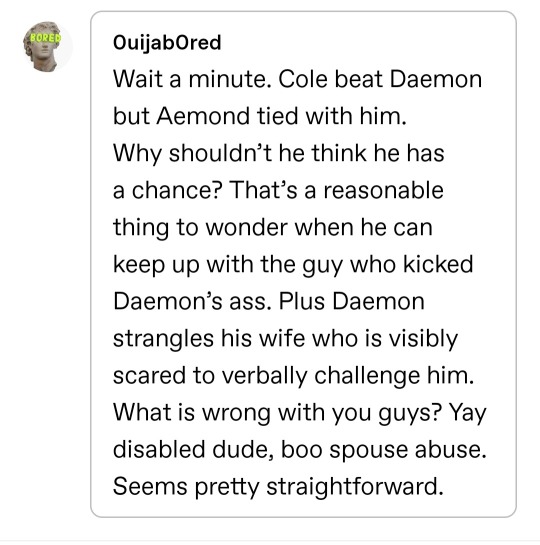
Criston Cole defeated Daemon by attacking him from behind. I don't call that a success. Daemon is a real soldier who went into the field, literally fought a war for real, and won. Criston Cole has never been on the battlefield. Also, the post only concerned Aemond and only makes him think he is a match for Daemon.
Also, what does Daemyra have in there ? Is not the subject.
And aren't the antis tired of bringing out the same incoherent strangulation scene as a sort of magic joker ? And then sorry, but where the hell is Rhaenyra afraid of verbally challenging Daemon ? She does the complete opposite, even after that stupid scene that makes no sense...
For this post :
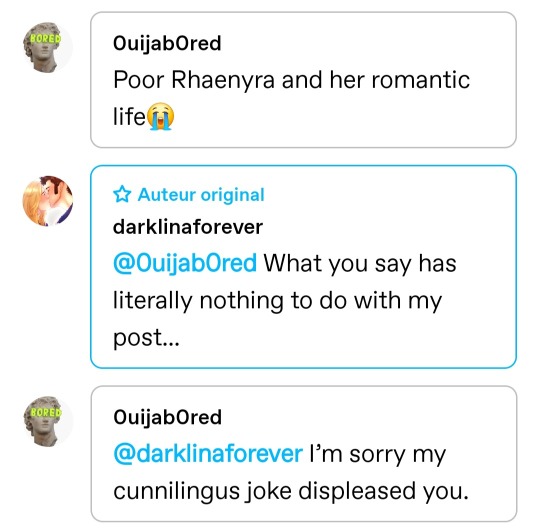
For this post :
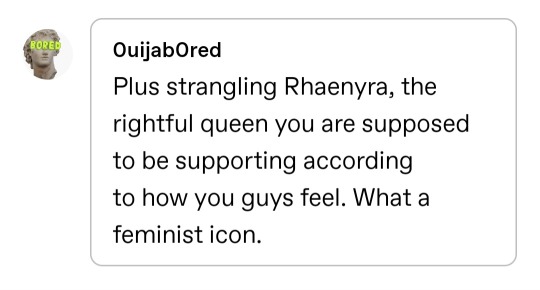
For this post :
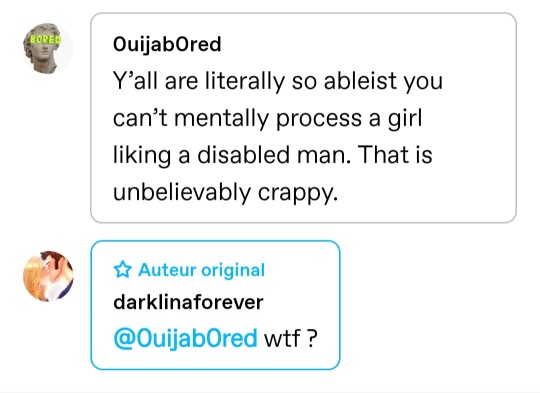
Ableist meaning : Discrimination or prejudice against individuals with disabilities.
So again ; Wtf ?
And then the last one that I know about one of my most recent post :
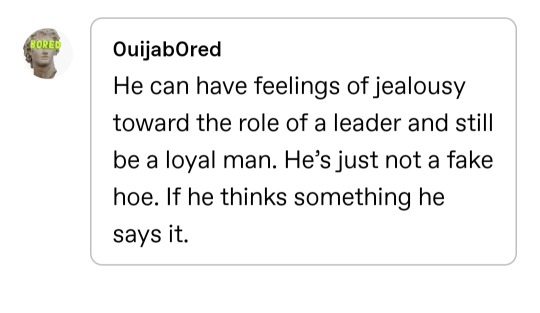
Once again, what does that mean ? I'm not talking about Aemond and his internal debates. I'm talking about the drastic difference in treatment between him and Daemon on the fact that the writers constantly question his loyalty to the monarch through the other characters, while there is no real proof that his loyalty can be questioned but who nevertheless never ceases to be so, but Aemond on the other hand, the one who directly says a sentence that could call his loyalty into doubt, strangely the screenwriters will never talk about a possible doubt about his loyalty to the characters, even by Criston, the one who witnessed Aemond's jealousy. That's what I'm talking about. Not Aemond's internal emotions.
Honestly, the antis Daemon, Rhaenyra and Daemyra, have nothing better to do than go to posts that don't concern them to piss off ? What kind of mentality do they have ?
#anti aemond stans#anti aemond targaryen#anti green#anti greens#anti green stans#anti greens stans#anti criston cole#pro daemon targaryen#daemon targaryen#the rogue prince#pro rhaenyra targaryen#rhaenyra targaryen#queen rhaenyra#the black queen#the dragon queen#the rightful queen#the half year queen#house of the dragon#hotd#team blacks#anti hotd#anti house of the dragon#pro team blacks#team black#pro team black#fire and blood#f&b#f&b spoilers#daemyra#pro daemyra
23 notes
·
View notes
Text
youtube
George R R Martin is an American novelist and short story writer, screenwriter, and television producer. He is the author of the series of epic fantasy novels A Song of Ice and Fire, which was adapted into the Emmy Award-winning HBO series Game of Thrones (2011–2019).
01 - The human heart in conflict with itself is the only thing worth writing about. You need characters to question who, and what, they are and how they fit within the world around them. This is key for character development.
02 - Write for yourself. Following trends, or pleasing your audience in spite of your own plans, harms good storytelling. Listening to critique is good, but inevitably you must be entertained and feel your way through the writing process.
03 - Anyone can die, and death is a key part of any story with conflict. Don't give your characters any special treatment, have them play by the same rules you set upon your world. Not only does it add constant tension, but it also creates a realistic atmosphere.
04 - Sometimes an idea can just come to you. If so, do not disregard it, instead follow the idea as a writer and write it! It could either lead into an interesting project or serve as useful practice.
05 - Show don’t tell. Immersion is essential to any story. Only through visuals and vivid descriptions of your world, can your audience even start to imagine themselves in your world.
06 - Allow yourself to discover in the process of writing. While you need to know the major outcomes of the story, and character arcs, allow yourself to enjoy and be aware of your sixth sense on your way through the story.
07 - When writing a script, dialogue should never be too long. Other than a few monologues, or moments, keep it short and sweet. Also, read the dialogue aloud by yourself or with the cast, this is a simple effective way to see if it works.
08 - When adapting a novel, you’ll always lose some content. However, a good adaptation rides the fine line between cutting side content and keeping smaller meaningful moments that enrich the story.
09 - Being a writer is not a career for those who wish to be stable. It is a massive risk in every way. A true writer, even during the lows of their career, will never stop storytelling. It is essential to whom they are. So, from a beginner to a bestseller, never stop writing.
10 - The ending to an act is fundamental to keeping the audience engaged with your story. Leaving it on a cliff-hanger, or teasing the audience with a different outcome can be the best way to break up converging storylines and finished acts.
94 notes
·
View notes
Text
3 Awesome Podcasts About Screenwriting (coming from someone who can barely listen to podcasts)
The FADE IN by Taylor Denham
Incredibly helpful. Taylor is kind of monotone, but I think it might stem from him being a beginner? Either way, the podcast is super useful, he gives really insightful tips AND examples (which really works for me). Every episode, he links resources and other podcasts on the subject. Super cool.
The Screenwriting Life with Meg LeFauve and Lorien McKenna
This one is by two ladies that work in the area (as well as a friend of theirs). They talk about screenwriting, but also selling your scripts, working in Hollywood. One of them worked in Captain Marvel and inside out and the other at Pixar. They're great and fun to listen to. I'm pretty sure they have had experience in this type of thing, honestly.
Haus of Film
This one is by three different people. It's not exclusively writing, but it's informative and entertaining and you get to know a bunch about the industry in general.
#podcasts#screenwriting#writing#writeblr#writing podcast#podcast recommendations#film making#films#movie making#hollywood
3 notes
·
View notes
Text
okay the worst part about still being in high school or finishing all your credits early but still having to be enrolled is taking electives. i'm in 3 film classes right now: one of high school level, one is an extracurricular non-profit organization class for kids 13-19 (mainly beginners of film, but many of my classmates were in the capstone class of this non-profit last year) & one at a community college locally that is an introduction to film & television production.
what i will say is that all of these classes are teaching things (at least right now) that i already know. of course, my community college class is teaching more advanced techniques as well as how to edit, but the thing i find most surprising is that my high school class is almost insulting in what it is teaching. my extracurricular, which is open to middle school aged people, is teaching more complex things than my high school. i just had to look through a set of flashcards that had to explain to me what a screenwriter, producer, & director were, like i am not already admitted to a film school with a major in screenwriting.
i don't know. this is a very flawed argument & i could play devils advocate very easily & basically destroy my points. i just feel a little belittled. it's weird to think that a film studies class for kids 15-18 would have to explain what a director is.
3 notes
·
View notes
Text

FIRST LOOK AT EWAN MCGREGOR AND THE CAST OF MY MASTER BUILDER!
Ewan McGregor returns to the West End in new play My Master Builder
Lila Raicek’s play, which McGregor describes as ‘a very modern take on today’s sexual politics’, will be the actor’s first London show in 17 years.
My Master Builder by American playwright Lila Raicek is stage by Michael Grandage, who previously directed McGregor in Othello and Guys and Dolls. Raicek’s play, inspired by Henrik Ibsen’s classic. The Master Builder stars McGregor as an architect, Henry Solness, whose wife throws him a party in the Hamptons to celebrate the unveiling of his new work. The evening is then disrupted by the arrival of his former student.

Ewan McGregor began his acting journey at the age of 16 as a stagehand at Perth Theatre 🏴
Ewan studied drama. He moved to London and enrolled in a three-year drama course at the Guildhall School of Music and Drama 🎭 a renowned institution for performing arts, after a year-long drama foundation course at Kirkcaldy College of Technology.

Early Roles: Before graduating, he secured a role in the TV miniseries "Lipstick on Your Collar" (1993), his first on-camera role
Films include: Christopher Robin in Christopher Robin, Cole in Zoe, Renton in T2 Trainspotting, Swede Levov in American Pastoral, Dave Braden in Miles Ahead, Perry in Our Kind of Traitor, John Bishop in Jane Got a Gun, Yeshua / The Demon in Last Days in the Desert, Bill in August: Osage County, Henry in The Impossible, Elmont in Jack The Giant Killer, Fred Jones in Salmon Fishing in the Yemen, Michael in Perfect Sense, Oliver in Beginners, Nanny McPhee Returns, The Ghost, Amelia, Bob Wilton in The Men Who Stare At Goats, I Love You Philip Morris, Deception, Incendiary, The List, Cassandra’s Dream, Stormbreaker, Miss Potter, Scenes of A Sexual Nature, Valiant, The Island, Robots, Obi Wan Kenobi in Star Wars I, II, III, Big Fish, Down With Love, Young Adam, Trainspotting, Shallow Grave, Moulin Rouge, Black Hawk Down, Rogue Trader, The Pillow Book, Emma, Brassed Off, Nightwatch, Nora, Eye Of The Beholder, A Life Less Ordinary, Velvet Goldmine, Little Voice.
Theatre: Iago in Othello (Donmar Warehouse), Guys and Dolls (West End), Little Malcolm and His Struggle Against the Eunuchs (Hampstead Theatre and West End).
TV: Emmit Stussy in Fargo (Netflix)

Ewan McGregor is joined by Elizabeth Debicki, Kate Fleetwood, David Ajala and Mirren Mack in MY MASTER BUILDER – a new play by American playwright and screenwriter Lila Raicek.




Performances of the new play are taking place in the West End -at Wyndham’s theatre on 17 April and runs until 12 July 2025

📸©Johan Persson
#MyMasterBuilder #EwanMcGregor #WestEnd #Theatre #ElizabethDebicki #Kate Fleetwood #DavidAjala #MirrenMack #LilaRaicek #London #MichaelGrandage #playwright #screenwriter
Posted 30th April 2025
5 notes
·
View notes
Text
#short film writing#screenwriting for beginners#writing for beginners#writing tips#screenwriting advice#screenplay format#author#fiction#readers#audience#script#writing movies#indie filmmakers#filmmaking advice#playwriting#scriptwriter#poet
1 note
·
View note
Text
The Emotional Arc: Unlock the Secret to Writing Stories that Move Audiences - April 19th
Tired of hearing the same storytelling advice repackaged with different terms? It’s time for something fresh, innovative, and truly transformative. In this exclusive live seminar, writer/producer and screenwriting coach Jordan Christopher Morris aka “The Writer Igniter” introduces The Emotional Arc—a groundbreaking, “centre-out” approach to storytelling designed to help you achieve the #1 goal of every writer: eliciting a powerful emotional response from your readers.


Jordan Christopher Morris
This isn’t just theory; it’s a practical, hands-on exploration of a new way to think about storytelling. Through engaging exercises, real-time feedback, and fresh insights, you’ll learn how to craft stories that resonate deeply and leave audiences craving more. Discover how to map your protagonist’s emotional journey (arc) in a way that feels authentic, compelling, and unforgettable.
Jordan is a writer, producer, and screenwriting coach known for his warm, approachable style and genuine passion for helping writers succeed. Whether you’re a beginner or a seasoned storyteller, Jordan works with writers of all backgrounds and skill levels to help them uncover their unique voice and craft stories that truly resonate.
More details.
#scriptwriting#screenwriting#script#write#amwriting#scriptcraft#scriptchat#writersoftumblr#writersontumblr#writersonwriting#scriptwritersnetwork#screenwritersnetwork
2 notes
·
View notes
Text
Alright, this is a writer’s tip that helped me a lot even though the learning that happened from it was completely unintentional. I’m sharing it here, because it 100% is why I’m where I’m at in terms of writing.
Take a book - any book, from any author and any genre, your favorite book if you want - and rewrite that shit front to back. Change some things if you want, add a spin to it. But point is to have that book next to you as you rewrite or retype it cover to cover.
I did this when I was eleven-years-old with my favorite book series (I was trynna rewrite it to incorporate a side character I REALLY loved into more of the story because I thought it was a disservice she wasn’t that prominent until later lol. I’m autistic, can you tell?) and it helped me a lot in many ways I didn’t even know way later when I started writing my own stories.
I learned how formatting a prose novel worked, aware that new paragraphs needed indents and that new dialogue started with a new paragraph and that not every dialogue needed a dialogue tag but could be followed by action or nothing at all and so much more.
It made it so a lotta the rudimentary mistakes weren’t ones I had to worry about, and even ones I could teach other writers to avoid. I literally have vivid memory that in my high sophomore year writing class - the first ever official writing class I’ve ever taken - it was basically me & the teacher describing how to properly do dialogue tags when we had that lesson, and I’d jump into answer questions based on things I remembered either reading or usually rewriting from that very book series I retyped. Ntm the first writing assignment I did for that teacher, she said she loved how I could balance action and dialogue, which I learned from retyping a published book.
And I’m sure to an extent it helped me with actually creating the content I was making, not just formatting. Especially how to make characters interact more fluidly and naturally, because I internalized that. There’s SO many benefits to this.
And this, of course, applies to more than just prose writing. It can be for screenwriting, playwriting, comic scripts or possibly comic formatting (if you’re an illustrator as well, mayhaps?), and so on and so forth. And it can be for any level of writer you are, whether you’re a beginner, middle ground, professional, or any other level.
So yeah! I recommend it 100% because it WILL help a lot!
Alright bye.
#nuny’s scribbles#writing#writeblr#writblr#writing community#writers on tumblr#creative writing#writer advice#writing advice#writers#long post
21 notes
·
View notes
Text
What Did I Watch: #40
Man, 2024 is to me, is the year of comeback of man-woman relationships in its glory. After so many years, I dumped myself into a the pool of BL shiz. Still I believe in love when it's happening on fiction.

I can see why a lot of people praised The Double. Because it reminded us about so many telenovelas back in the day man. I can help but laughing actually. The editing, the villains, the slow burn of the romance. This is a god tier telenovela cramped into 40 episodes.
The fact that the revenge willing to go there. To make the villain actually bad bad and not somehow in the middle of the road they're got their redemption, instead they were getting worse to the point I screamed at my tablet "FUCKKKK THIS IS ROSALINDAAAAA" (the only telenovela I watched religiously from beginning to the end).
Kinda wanting to give props towards the romance though. Dude, even there were no kissing scenes up until the last episode, I just love it. The flirting, the hand held, the way their bodies just reacted to each other. I don't feel their real life age gap in any of their scenes. God what a pro.

Still not finish this show, but what a masterpiece. Li Yunrui in that dusky grey hair. Fuck my life. This is a general and I believe every second he was in it, yes he is a general. Not some kids pretending to be a general.
But Blossom at its centerpiece is about a woman's attempt to right every wrongdoing. And stand by the side of her man without a single doubt. Applause to Meng-jie. Applause to the screenwriters that actually do write a smart woman and keeps being smart with or without a man. As well as graced us with such a beautiful love story about what exactly do we mean about power couple.

I wasn't planning to watch, heck, even finish We Are. But somehow in the pool of so many BL content creator/watcher, they kind of unanimously praised this show. They would say something like similar to Love Sick or Make It Right. So to some extent I knew this wasn't something in my preferences.
Therefore, I just had one thought during the whole binge-watched. It's all about vibes. You definitely can make a show based on vibes and nothing more. I'm not being sarcastic or judgy per se. This show is truly what BL vibes looked like. A show for beginner. For someone who doesn't want to think to thoroughly in life. Or being such an asshole because starting a debate whether a certain show is BL or not BL (HA!).
The concution after all, just give Aou and Boom a show man.
5 notes
·
View notes
Text
How are we out there, in the Slow Apocalypse? Hydrating? Go get a glass of water. I'll wait. And do that square breathing.
If you thought I was joking about the water, I wasn't.
This week's newsletter probably falls into the beginner level of screenwriting advice, which'll happen. Those of you with overalls can skip to the recommendations below.
We dropped a fun little tip last week, but we should probably start with first principles. What is a script? To paraphrase the pragmatists (William James, you moody gorgeous bastard), the thing is what it does. So what is a script supposed to do? What's the script's job? As art and object?
John Rogers has a newsletter now.
#john rogers#leverage#the librarians#leverage redemption#screenwriting#the more you know#if you read his kung fu monkey blog back in the day you'll want to sign up#if you didn't you'll want to sign up#admin: lets-steal-an-archive
18 notes
·
View notes